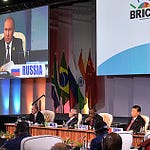A quick announcement: We’re holding a free live Sovereign Finance discussion on Sunday 22nd June, at 7.30PM on Zoom. We’ll discuss global trends, things you might do, and answer questions from the podcast so far. Register for free here.
Rob’s comments below are in italics.
Derek’s comments below are in normal font.
We're going to do another weekly recap this week, which is useful for me because I tend to live my weeks with my head in the sand, buried in my own affairs. It's good for me to catch up and stay aware of what's going on. So, what is happening that we need to know about?
I wanted to discuss the general phenomenon of warfare, as it has a significant impact on the standard of living that we can all aspire to.
The point is that any war incurs massive financial costs, as well as substantial energy and resource costs. These are all diversions from other things that those financial instruments could accomplish.
From constructive things as opposed to destructive things.
Yeah, constructive things. The core of our topic on this podcast is wealth. As I've mentioned in the past, wealth also comes from the same root. So wealth is a measure of well-being.
Yeah, it's holistic. It's not just a monetary measure.
The fact that you can put a numerical monetary figure on it is not the point. The fact that you can put a numerical monetary figure on anything doesn't mean that it deserves to be called wealth. There have been suggestions that we should have a word, ilf, meaning things that detract from your wellbeing. It makes you ill in one way or another.
Obviously, weaponry, military equipment, explosives and ammunition are all examples of ill in that sense. Another example of ilf is the things that unintentionally get produced as a side effect from any process of wealth creation or anything that any of us do in the world. It creates a certain amount of waste, a certain amount of pollution, a certain amount of consumption of finite resources that could have been applied somewhere else.
Yeah, to use an economics term, there is an opportunity cost with all of these things you choose to do.
I must take bit of time at some stage to gather some statistics because the wars that are going on in the world now are comparable in terms of ammunition and explosives that are consumed as the entire Second World War.
We also need to consider this in the context that, at some point over the next few decades, we will reach a crisis in fossil fuel consumption. As we've discussed before, we've done very little in terms of strategic planning regarding how to transition from our current reliance on fossil fuels to something sustainable for the indefinite future. I, for one, believe that it's still entirely possible that we could be living on current sunlight energy and do this without reducing ourselves to a medieval or palaeolithic lifestyle if it were done intelligently.
However, to overhaul our entire infrastructure to reach that point is something that, in itself, is inevitably going to consume a lot of energy. If we were being intelligent about it, we would be applying the energy to rebuilding that infrastructure to gather some light, to use it and to organise ourselves in far more efficient ways than we're doing at the moment, which there's plenty of scope for.
A more decentralised way of doing things might be the only way because you can't necessarily store all the power. We saw that with Spain, in terms of big surges of energy.
Yeah, so instead of that, apart from things like all the billionaires flying around the world in private jets, we're squandering huge amounts of energy in destroying things.
On things that go boom…
Yeah, and killing people. Anyway, so that's all going on. In case people were wondering how this relates to the core topic, which is bringing our individual finances under control, this is an aspect that we need to be taking care of. The sheer insanity of the world has two crucial aspects of context to help us view what's going on.
One of those pieces of context is that we're reaching all kinds of overshoot situations, as modelled by the limits to growth, which we've discussed previously on several occasions. So far, the way that the world's population, food production, industrial capital, industrial production, levels of pollution, all of the things that were modelled in that model in the Limits to Growth are almost exactly on track for the reference run for the 50-odd years since that was published.
That's impressive.
What that run shows is that one or the other of those is going to go into collapse mode in the next quarter century.
Yeah, because the biosphere is not something that can be plundered forever, presumably.
That's it. Let's say the model is unduly pessimistic in that regard, and it takes another few decades. That's not impossible, but given its accuracy so far, we should consider it. Many of the ways politics is reacting involve people being unrealistic about coming to terms with it.
Another significant aspect of context is that I would argue the American Empire is now in the final stages of decline, as was the British Empire previously, as well as those of the Dutch, Italian, Roman, Portuguese, and Spanish empires. The Persian Empire, like many throughout history, has followed a cycle of arising, prospering, peaking, and then declining. That is the stage of the American Empire. However, what is truly alarming is that it still possesses far more military power, despite being in a stage of decline. We can’t know how it will act or what the repercussions may be.
Going back to these wars, that's one of the issues. Because it's not really Russia versus Ukraine, it's Russia against a proxy of the US empire. That's been going on for a long time. But you go further back into the conflict.
The bizarre thing, as I mentioned last week, is that in the mainstream news media, there is very little discussion. There are enormous actual developments every single day of the week in the Ukrainian conflict.
The heartening thing I find is that there are many well-informed and intelligent people in the alternative media who are receiving a very large hearing and following. Most of them have their main output on things like Substack. However, most of them have a significant following on YouTube for at least a portion of their content.
There are different people with varying perspectives, but there's a steady, persistent drip, drip, drip against the consistency of the propaganda we've all been subjected to since time immemorial. Sooner or later, cracks must appear as we discussed last week.
I find notable informed commentators include Douglas McGregor, Scott Ritter, and Daniel Davies, who are all former military personnel. All these people I mentioned, I listen to and analyse critically, not necessarily 100% slavishly believing everything they say, but informing myself to try and get a rounded, critical, realistic estimation. Those are all pretty good for the military analysis. They're all accomplished ex-military officers. Very knowledgeable, and it appeared to me to be very intelligent and also extremely honest and forthright.
Then you've Jeffrey Sachs, an economist who has worked with governments worldwide and with the UN. You've got Pepe Escobar, whom I find really amusing, really penetrating, and really well-informed. Danny Haifong, who has a video blog with interviews with a whole variety of people, including all the ones I've mentioned so far and the ones I get on.
Pepe Escobar is another commentator on geopolitics who's really well informed, really quite amusing. He's just travelled to China and Iran. He's going to go to Russia. Danny Haifong runs a daily video podcast featuring interviews with all these people, who are really well-informed. Brian Beletic is another really good, well-informed geopolitical commentator. Ben Norton and John Mearsheimer are very accomplished economists and geopolitical commentators.
Mearsheimer foresaw the Ukraine situation by about eight years.
Another good one is Larry Johnson, who's a former CIA analyst. Seems very clear, very honest. All of this is set against the background, which many people seem unconcerned about.
In a world where there are enormous stockpiles of nuclear weapons, it's not impossible that we could get triggered into an exchange, which at the very least would be the end of global civilisation and possibly the extinction of the human race, possibly the extinction of all higher life forms on earth. From the point of view of someone deciding to deliberately go ahead with launching a strike, but also with an accident or a miscalculation. This has happened dozens of times. It's a real possibility as long as these things exist and are primed and ready to launch.
Which makes the behaviour of the British, French and German leaders look particularly reckless. We've now had the announcement from Chancellor Mertz, the new German leader, that he's prepared to supply Taurus missiles to Ukraine and not to impose any limitations on the range at which they're used. Now, these are capable of striking deep into Russia.
Whether Russia's got the capacity to intercept them or not, I don't know. But if one were launched at Russia, that would almost certainly result in Russia interpreting this as a direct declaration of war by Germany and respond to it. Obviously, that could escalate the entire situation out of control. Nobody seems to be taking this seriously as far as I'm concerned.
Daniel Ellsberg outlined all of this in his book, The Doomsday Machine, didn't he?
Yeah, absolutely. One of the positive developments that has occurred since Trump's ascension to the presidency has been at least an opening of normal diplomatic contact between Russia and the United States. It leaves a lot to be desired, but it's better than nothing. It's bizarre, this idea that when tensions arise, you stop speaking to people. This is the very moment when we should be ramping up our speaking and, more importantly, our listening, trying to understand how the world appears to other people.
There's historical precedent; just look at Kennedy and Khrushchev, who averted a major catastrophe in the past.
Yeah. And a lot of luck to be honest. Which is another point. You know, they have this whole thing about the so-called nuclear football, which is a rather strange name. It's a briefcase containing the codes that accompanies the president. To the president of the United States, wherever he goes, a guy is trailing around with him carrying this briefcase. It's just pure theatre, yeah. There are any number of people who are in a position to fire at least one nuclear missile with or without.
This has been the case since the late fifties, or early sixties…
So we'll see what it is. Now, the other ridiculously reckless thing that happened is Ukraine launching several waves of over 2000 drones towards Russian cities. Very few of them got through. There was certainly at least one residential apartment building in Moscow that was hit. Some commentators theorised that these were to stretch and exhaust Russia's air defence systems in preparation for maybe a more serious strike.
Which, you know, once again, the consequences of this could be catastrophic. Then there was a response by Russia of a large number of drone attacks on Ukraine. This prompted a public outburst by Trump, saying that Putin's gone crazy.
In fact, these responses were all measured. There have been a few civilian casualties in Ukraine. It's not clear whether these were from actual strikes or whether they were falling debris from drones that were shot down by the air defences. All of the targets were of military significance. They were either ammunition centres, troop centres, or military aircraft bases. There was an enormous explosion in Odessa, which was a strike on a ship which was bringing in arms and ammunition to Ukraine. So, you know, those were legitimate military targets.
Now we've had the exchange of a thousand prisoners from each side. That's obviously a positive thing; it was brought on, and they paved the way for the next stage, which is to exchange memoranda on how they will see the path to progress towards peace. The Russians have announced that they're ready to send a delegation to Istanbul on Monday. It's not certain at the moment whether the Ukrainians will respond to that or not. However, it does seem highly unlikely that those talks will get anywhere, as the Russians have made their demands clear in the past.
Yeah, we all know where the red lines are.
It's highly unlikely that the Ukrainians will go, “yes, all right.” Of course, the demands are now larger. The Russians want effectively a demilitarised zone 300 kilometres along the northern border of Ukraine, precisely to preclude anything in that area being able to launch attacks towards Moscow. The extraordinary thing is, according to the Western media, the Russians are very devious and we can't take anything they say at face value. As far as I can see, their track record is pretty good.
Of course, this all goes back to 1991. You could argue that the Russians have been astonishingly trusting. When Gorbachev decided to disband the Warsaw Pact and dissolve the Soviet Union, the American James Baker stated that NATO would not expand one inch eastward. Well, of course, precisely the opposite has happened. In fact, nearly every single undertaking that the Americans have undertaken has been consistently broken. But now it's clearly reached the point that they're saying, “We're just not going to take anything on trust anymore.” It's hardly surprising.
This is the thing: look at the movement of troops and equipment around the globe, not what they're saying.
When Clinton went to Russia to meet Putin, in 97 or 98, Putin, tongue in cheek, said, “maybe I could join NATO?”. Clinton said, “Well, I'll have to talk to the team about that!” But when the Warsaw Pact was dissolved and the Soviet Union was dissolved. There was no longer any logical need for NATO.
So we have to see how this unfolds. Trump has been all over the show with the things he's saying. It's difficult to know whether he's really in the dark about what's going on, whether he's not got the concentration to regard it, whether his appearance of being a complete buffoon is to some degree an act or not. He's certainly an accomplished actor. He's been a television personality for 15 years, running the Apprentice programme. I saw that a couple of times, the British version with Alan Sugar. I just thought it was ridiculous. It was nothing like anything I've experienced in running a real business. It sometimes seems as though Trump regards being president of the United States as a continuation of a reality show, which perhaps in a sense, it is. He is obviously being pulled in many different directions.
He hasn't got, as we've mentioned before, a cohesive team. He's got people who seem to be quite sensible, like Wyckoff, and people who are severe warmongers, like Rubio and Kellogg. So it's been pulled in different directions. We don't know how much of whatever intelligence they have gathered is being presented to him. He's obviously got to juggle between keeping his supporters happy, which is going to be impossible, and dealing with the various components, opponents he's got in the political opponents in Congress, in the media.
He could well just be a useful idiot frontman.
So, meanwhile, we've got the continuing destruction in Gaza. Apart from America and its immediate satellites, the rest of the world's countries are watching in dismay and disbelief as all this unfolds. Of course, another notable development is that the last few years have seen Russia and China building alliances economically and politically with an increasing number of countries worldwide. We must consider the application of these sanctions and tariffs in that context as being completely futile. They're futile on two levels. Indeed, as far as Russia is concerned, it's already been sanctioned to death. There isn't really anything more to apply. But more and more, they're going, “Okay, the United States doesn't want to deal with us. We won't deal with them.”
All it has done is catalyse different people around the world forming separate partnerships outside of the system. It's just accelerated that process.
Additionally, consider the infrastructure in China, including civil engineering projects, bridges, tunnels, roads, and railways. They've just conducted a trial of their Maglev rail system, which can reach speeds of 622 miles per hour, surpassing the speed of an airliner. There's nothing in the Western world that compares with that. Anyway.
Ours are falling to bits!
In Britain, a lot of it's barely out of the 19th century. Anyway, there we go. Interesting. If we're all alive next week, we'll see where we go from there. We'll likely return to the core topic of this podcast. OK.
Sounds good to me. All right, thanks, Derek.














Share this post